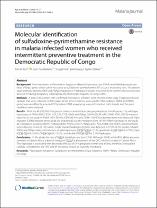| dc.contributor.author | Ruh, Emrah | |
| dc.contributor.author | Bateko, Jean Paul | |
| dc.contributor.author | İmir, Turgut | |
| dc.contributor.author | Taylan Özkan, Hikmet Ayşegül | |
| dc.date.accessioned | 2019-05-13T09:03:59Z | |
| dc.date.available | 2019-05-13T09:03:59Z | |
| dc.date.issued | 2018 | |
| dc.identifier.citation | Ruh, E., Bateko, J. P., İmir, T., Taylan Özkan, H. A. (2018). Molecular identification of sulfadoxine-pyrimethamine resistance in malaria infected women who received intermittent preventive treatment in the Democratic Republic of Congo. Malaria Journal, 17(1). | en_US |
| dc.identifier.issn | 1475-2875 | |
| dc.identifier.uri | https://doi.org/10.1186/s12936-017-2160-x | |
| dc.identifier.uri | https://hdl.handle.net/11491/1571 | |
| dc.description.abstract | Background: Point mutations in Plasmodium falciparum dihydrofolate reductase (Pfdhfr) and dihydropteroate synthase (Pfdhps) genes which confer resistance to sulfadoxine-pyrimethamine (SP) occur at increasing rates. The present study aimed to identify Pfdhfr and Pfdhps mutations in P. falciparum isolates recovered from women who received two doses of SP during pregnancy in Bandundu, the Democratic Republic of Congo (DRC). Methods: A total of 48 women with confirmed P. falciparum infection were enrolled in the study. Finger-prick blood samples that were collected on filter paper at the time of delivery were used for DNA isolation. Pfdhfr and Pfdhps genes were amplified by a nested PCR protocol. DNA sequencing was performed on both strands, and the point mutations were analysed. Results: All of the 48 (100.0%) P. falciparum isolates carried at least one polymorphism in both genes. The wild-type haplotypes of Pfdhfr (CNCSI [C50, N51, C59, S108, I164]) and Pfdhps (SAKAA [S436, A437, K540, A581, A613]) were not observed in the study. In Pfdhfr, N51I (85.4%), C59R (60.4%), and S108N (100.0%) polymorphisms were detected. Triple mutation (CIRNI) (mutant amino acids are underlined) was the most prevalent (47.9%) Pfdhfr haplotype. In the study, all P. falciparum isolates (100.0%) harboured the A437G allele in Pfdhps gene. Also, K540E and A581G polymorphisms were observed in one (2.1%) isolate. Single mutant haplotype (SGKAA) was detected in 97.9% of the isolates. Mutant Pfdhfr and Pfdhps allele combinations revealed quintuple (CICNI-SGEGA; 2.1%), quadruple (CIRNI-SGKAA; 47.9%), triple (CICNI-SGKAA; 35.4%, CNRNI-SGKAA; 12.5%), and double (CNCNI-SGKAA; 2.1%) haplotypes. Conclusions: In the study, the rate of SGEGA haplotype was low (2.1%). Although K540E and A581G alleles are more common in Eastern Africa, a distinct lineage of SGEGA is also present in the DRC, which is located in Central Africa. This haplotype is associated with decreased efficacy of SP in pregnant women and infants, therefore, it should be carefully considered in the DRC and SP resistance should be routinely monitored. © 2018 The Author(s). | en_US |
| dc.language.iso | eng | |
| dc.publisher | BioMed Central Ltd. | en_US |
| dc.relation.isversionof | 10.1186/s12936-017-2160-x | en_US |
| dc.rights | info:eu-repo/semantics/openAccess | en_US |
| dc.rights | Attribution 4.0 International (CC BY 4.0) | * |
| dc.rights.uri | https://creativecommons.org/licenses/by/4.0/ | * |
| dc.subject | Democratic Republic of Congo | en_US |
| dc.subject | Drug Resistance | en_US |
| dc.subject | Pfdhfr | en_US |
| dc.subject | Pfdhps | en_US |
| dc.subject | Plasmodium Falciparum | en_US |
| dc.subject | Sulfadoxine-Pyrimethamine | en_US |
| dc.title | Molecular identification of sulfadoxine-pyrimethamine resistance in malaria infected women who received intermittent preventive treatment in the Democratic Republic of Congo | en_US |
| dc.type | article | en_US |
| dc.relation.journal | Malaria Journal | en_US |
| dc.department | Hitit Üniversitesi, Tıp Fakültesi, Temel Tıp Bilimleri Bölümü | en_US |
| dc.authorid | 0000-0001-8421-3625 | en_US |
| dc.identifier.volume | 17 | en_US |
| dc.identifier.issue | 1 | en_US |
| dc.relation.publicationcategory | Makale - Uluslararası Hakemli Dergi - Kurum Öğretim Elemanı | en_US |



















